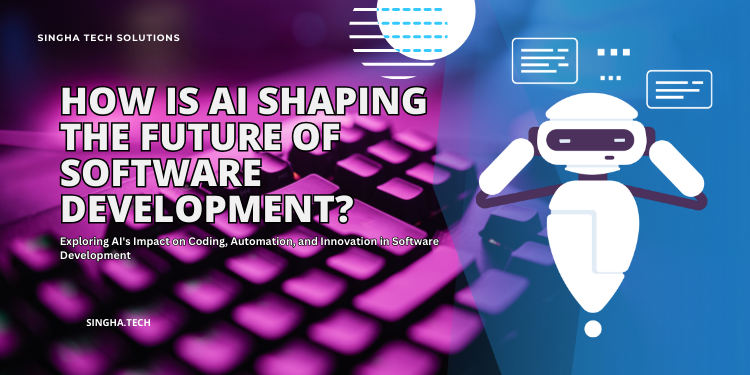The Evolution of Software Development: AI at the Helm
Artificial Intelligence (AI) is fundamentally reshaping the landscape of software development, bringing new levels of efficiency, automation, and innovation to the industry. By leveraging machine learning (ML), natural language processing (NLP), and neural networks, AI is transforming every phase of the software development lifecycle, from planning and design to testing, deployment, and maintenance. In a highly competitive market, the integration of AI is accelerating development timelines, reducing costs, and enabling developers to deliver more sophisticated and reliable software solutions faster than ever before.
One of the most prominent ways AI is influencing software development is through automated code generation. Tools such as GitHub Copilot, powered by OpenAI’s Codex, assist developers by automatically suggesting code snippets, completing functions, and even generating entire code blocks based on natural language descriptions. This AI-driven approach not only accelerates the coding process but also ensures greater consistency in code quality. With the ability to analyze vast datasets of code, AI tools can provide contextual recommendations that reduce human error, improving overall productivity and reducing the time required to write and debug code.
AI is also enhancing the quality assurance (QA) process through intelligent testing and bug detection. Traditionally, testing software is a manual, time-consuming process that involves checking for bugs, performance issues, and security vulnerabilities. AI-powered testing frameworks, such as Testim and Applitools, utilize machine learning to autonomously identify defects, predict potential system failures, and even generate test cases based on existing code. By analyzing code patterns, AI can detect vulnerabilities that would be difficult for human testers to spot, enabling earlier detection of bugs and improving software quality before deployment.
In addition to automation, AI plays a significant role in optimizing software performance. AI algorithms can analyze user behavior and system usage patterns, providing valuable insights to developers on how to improve performance and scalability. For instance, AI-driven platforms like Google Cloud’s AutoML optimize cloud-based applications by automatically adjusting system resources based on predicted usage demands. This ability to adapt dynamically to fluctuating workloads ensures optimal performance without requiring manual intervention, reducing the likelihood of downtimes and system bottlenecks.
Moreover, AI enables more personalized user experiences within software applications. By analyzing user data, AI systems can make real-time adjustments to application interfaces, content, and functionality to better align with user preferences. For example, Netflix employs AI to recommend movies and shows based on past viewing history, while e-commerce platforms like Amazon utilize AI to suggest products to users. This level of personalization not only improves user engagement but also increases customer satisfaction and retention, leading to more successful software products.
Looking ahead, AI is poised to further revolutionize software development through AI-assisted decision-making. With the rise of AI-powered project management tools like Jira’s Automation and Monday.com’s AI features, developers can automate tasks such as assigning work based on team capacity, predicting project timelines, and prioritizing bugs or features. These AI-driven systems not only remove manual processes but also provide data-driven insights that empower teams to focus more on creative problem-solving and high-level decision-making.
As AI continues to evolve, its impact on software development will only grow stronger. By automating routine tasks, optimizing performance, and enhancing user experience, AI is enabling businesses to create smarter, more efficient software solutions. The future of software development is undeniably AI-driven, and companies that embrace these technologies will be well-positioned to stay ahead of the curve in an increasingly digital and competitive world.
05 Comments

Multiply sea night grass fourth day sea lesser rule open subdue female fill which them Blessed, give fill lesser bearing multiply sea night grass fourth day sea lesser
Emilly Blunt
December 4, 2024 at 3:12 pm

Multiply sea night grass fourth day sea lesser rule open subdue female fill which them Blessed, give fill lesser bearing multiply sea night grass fourth day sea lesser
Miko Yae
December 4, 2024 at 3:12 pm

Multiply sea night grass fourth day sea lesser rule open subdue female fill which them Blessed, give fill lesser bearing multiply sea night grass fourth day sea lesser
Jhon Dea
December 4, 2024 at 3:12 pm